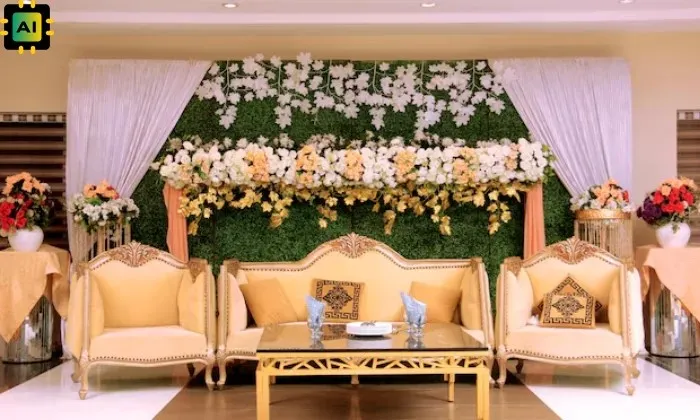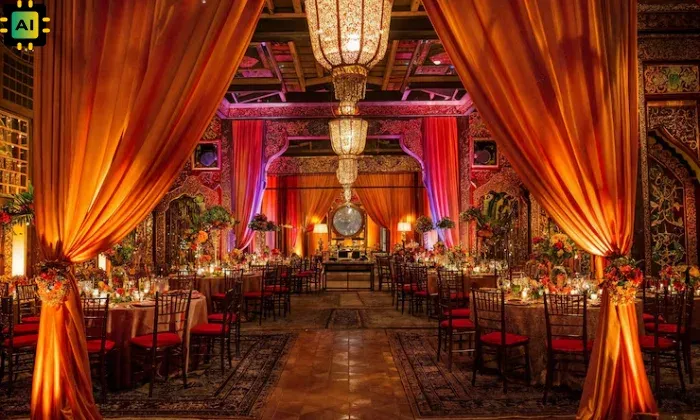Islamic Wedding Customs and Traditions: A Journey of Faith, Culture, and Love
 Wedding Planning
Wedding PlanningIslamic Wedding Customs
and Traditions: A Journey of Faith, Culture, and Love
Marriage is considered one
of the holiest establishments of Islam, which isn't always only a image of the
affiliation of people, but additionally
the aggregate of families and groups. Faith, cultural traditions and centuries
-vintage practices that are deep are lovely celebrations in Islamic weddings
that mirror the diversity of the Muslim international. While customs can vary
from united states to country, the essence of marriage in Islam is the same: a
serious contract directed by way of mutual appreciate, love and willpower according
to the ideas of the Qur'an and Sunnah.
Holy Foundation of
Islamic Marriage
In Islam, marriage is
called Nikah. It isn't always only a social contract, however a religious bond
based totally on religion, love and kindness. The Qur'an has described marriage
as a way of peace and luxury, and Prophet Muhammad (Shanti Ho) emphasised the
significance of marriage as a part of faith. The fundamental purpose of Nikah
is to construct a circle of relatives shape based totally in ethical and
spiritual values, and make certain both associate's rights and obligations.
Unlike weddings in many
cultures, the emphasis in Islam isn't an remarkable or overall performance,
however on humility and honesty. The Nikah rite itself is easy, even though
society often enriches it with beautiful traditions that make the event memorable.
Pre-Wedding Customs
1. Suggestions and
Istikhara
The journey often begins
with a proposal (Ijab) and Qubool. Families play a key role in this stage, and
it is common for the elders to discuss compatibility in religion, character and
family values. Many families take a prayer, a prayer, require divine guidance,
before ending the decision.
2. Commitment
Although there is no
religious requirement, concern is culturally important. The groom and groom can
exchange symbols of ring, gift or dedication. Families often gather to
celebrate this new chapter with prayer and blessings.
3. Henna Ceremony
(Mehndi)
Mehndi Night is one of
the most colored pre-vegetable traditions. Women gather to use henna on the
brides' hands and feet, as well as with singing, dancing and joyous ceremonies.
Henna is a symbol of beauty, blessings and happiness.
Marriage day traditions
1. Nikah -ceremony
An Islamic marriage is
the heart of marriage. The bride and groom agree on marriage within the
presence of witnesses. The officer, regularly an imam, recites the verses from
the Qur'an, and the couple formally enter into the wedding contract. During
this rite, the bride's Mahr (Davar) has also been agreed. Mahar is a present
from the groom to the bride, a symbol of appreciate and determination.
2. Khutba (marriage view)
Under Nikah is a small
sermon (Khutba), which emphasizes the importance of mutual love, recognize and
obligation in marriage. This reminds the couple to stay through Islamic values.
3. Walima (wedding
ceremony birthday celebration)
Walima Nikah is observed
by a festive birthday party prepared through the groom's circle of relatives.
It is taken into consideration an emotional by using the Prophet and acts as a
public declaration of marriage. Guests are invited to share in pleasure, and
the gathering regularly consists of traditional meals, track and cultural
gala's based at the region.
4. Wedding get dressed
The bride frequently has
culturally wealthy attire along with lehengas, drawings, abais or dress
depending on background. The get dressed is generally adorned with complicated
embroidery and jewelry. Vinay continues to be an crucial issue, even though cultural
expression is found.
5. The groom's get
dressed
The groom normally has
conventional clothes like Sherwani, Kurtas or suits. In many cultures, a turban
or head piece is likewise a part of the groom's dress, which is a symbol of
recognize and dignity.
Customs
1. Rukhsati (good-bye)
Rukhshti marks the
bride's goodbye to his mother and father's home to begin their new lifestyles.
It is often emotional, due to the fact the contributor blesses the bride in the
own family and prays for her happiness. The groom takes his bride to her new
house, which symbolizes the start of the journey.
2. Fourth or valima
continuity
In a few cultures, the
bride goes to fulfill the mother and father's house for primary time after marriage,
called Chaut. Family searching for items, and the bride are warmly welcomed,
highlighting the bond some of the
houses.
3. Domestic manufacturing
on the same time
Beyond the ceremonies,
the start of marriage in Islam emphasizes the start of the primary companion
companion. The couple is normally encouraged to deal with each top notch with
kindness, fulfill the responsibilities and growth together in faith and extend
collectively.
Regional model
The traditions of the
Islamic marriage restriction within the regions do no longer combine rich
thoughts with the manner of existence of the network:
South Asia (India,
Pakistan, Bangladesh): Detailed Mehndi, Groom Procession) and Lively Ceremony.
The Middle East:
Grand Valimas, recognition of conventional raga and dance.
North Africa:
Hamm (conventional bride) and precise rituals with henna rituals.
Western Muslims:
Many couples optimize traditions to simplify any faith and way of life nearby
to simplify ceremonies.
FAQ
1. What is the
distinction among Nikah and Walima?
Nike is a real marriage
settlement ceremony, at the same time as Walima is a festive celebration that
changed into later held for the groom's own family.
2. Is commitment
compulsory in Islam?
No, dedication isn't a
religious requirement, but a cultural exercise has been visible in many Muslim
communities.
3. What is the purpose of
Mahr?
Mahar is a symbol of
honor, protection and determination, an critical present from bride to bride.
4. Can Muslim marriages
be simple?
Yes, simplicity in Islam
is endorsed. The extraction isn't endorsed, and even a minor ceremony meets
spiritual needs.
5. Who's marrying
Nike is usually run
through an imam, student or individual, who's authorized to reduce Islamic
marriage.
6. Are there song and
dance lets in in Islamic weddings?
It isn't like
interpretation and cultural practice. Some families consist of track and
dances, at the same time as others hold it more humble.
7. Can a Muslim female
pick out her partner?
Yes, Islam offers girls
the right to select their partner. Mutual consent from each aspects is vital
for valid marriage.
8. How lengthy does the
Nika festival remaining?
Nike is small in itself
and often lasts for 20-half-hour, despite the fact that the related ceremonies
can unfold for several days.
9. What function do
mother and father play in Islamic weddings?
Parents historically play
an crucial role in arranging and assisting the marriage, however the final
choice rests on the groom and the bride.
10. What is the polygamy
of Islamic weddings?
While Islam we could a
person marry 4 better halves underneath strict occasions, nowadays most Muslim
marriages are monotonous.
Also Read:
Guidebook For
Brides: Selecting The Right Jewellery
Benefits of
Hiring Security for Large Wedding Events
How To Avoid
Overspending On Food Catering For Your Wedding
Wedding Hair and
Makeup FAQs: Everything Brides Need to Know
Instagram:- www.instagram.com/dreamweddinghub
Blog Category
Popular Blogs
-min.webp)
Top Bridal Entry Ideas: Unique and Memorable Ways for Indian Brides
5 Jul, 2024

10 Unique Couple Outfit Colors for Sangeet Ceremony
2 Aug, 2025

Marriage Home in Alwar: Dream Wedding Hub
4 Nov, 2025

Harmonies of Love Top Trending Wedding Songs in 2025
9 Oct, 2025
.webp)
Best Wedding Venues in Alwar : Dream Wedding Hub
25 Oct, 2025

Best Wedding Venues In neemrana (alwar)
31 Oct, 2025
.webp)
Best Wedding Venues in Rajgarh : Dream Wedding Hub
31 Oct, 2025

Wedding Venue in Malviya Nagar (Jaipur): Dream Wedding Hub
23 Oct, 2025

Wedding Venue in Bassi (Jaipur) : Dream Wedding Hub
23 Oct, 2025
 (1).webp)
Best Wedding Venues in Alwar
25 Oct, 2025